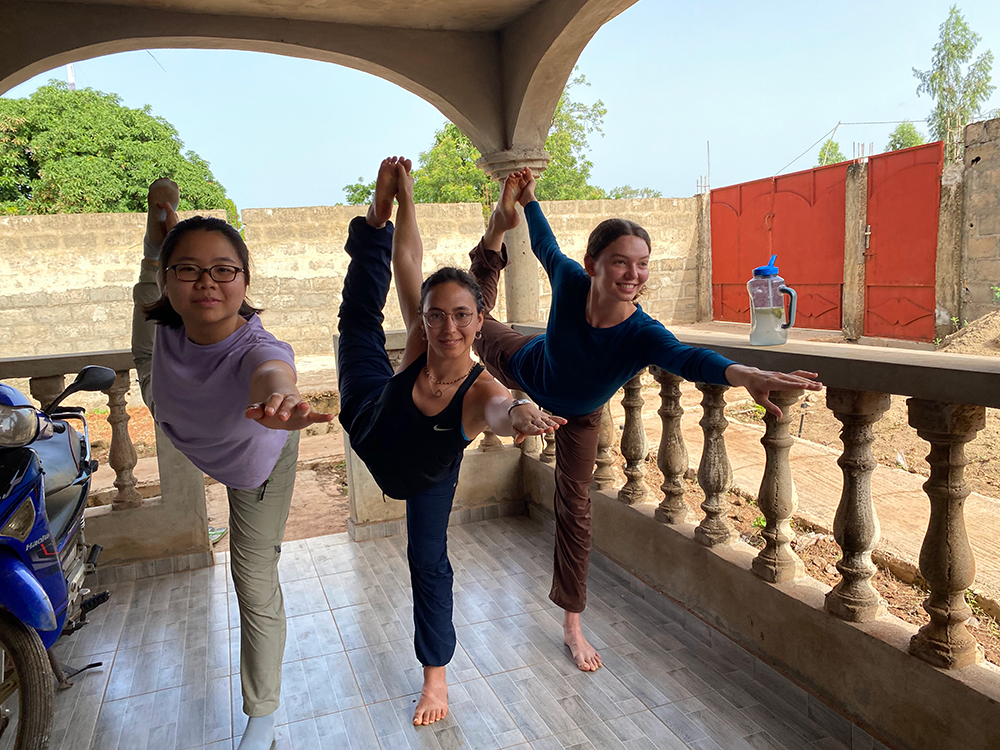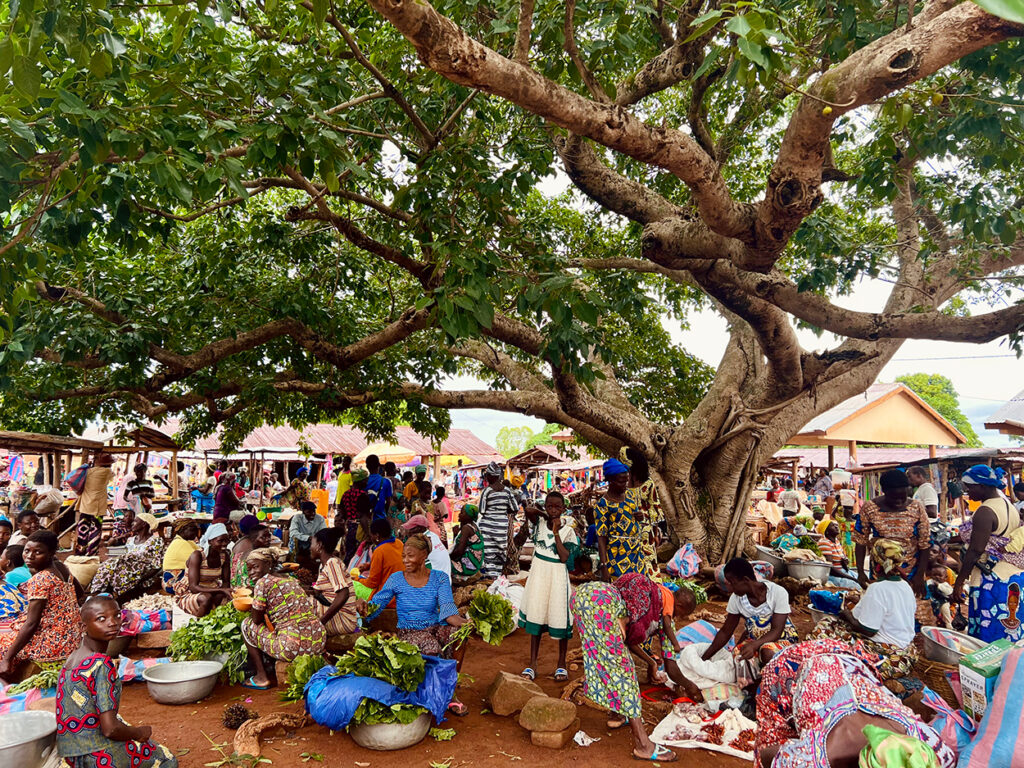DukeEngage Togo collaborates on several projects with two Togolese villages, Kuwde (in the mountains) and Farendé (on the plains). Most focus on youth enrichment. While culturally rich, the area has few amenities — hence a high rate of youth migration. DukeEngage Togo students offer classes and cultural exchange programs to youth. Here, Sasha Faison writes about her experience teaching and Togolese ceremonies and social life.
For the past two months I have been completely immersed with five other Duke students in rural Togo. Another student and I live up in a mountain village, Kuwde, with no running water or electricity in homesteads with our host families. The rest live an hour’s hike away, in another village called Farendé.
My focus during my time here was continuing a project created by a previous student of maintaining a writer’s collective. This involved teaching a writing class twice a week in Farendé with a fellow student, Montana [Lee]. Due to this year’s student age and level being lower than in previous years, we adapted and focused on the basics.
Much of the youth in the villages, particularly the boys, leave pour se chercher; meaning to make money in Nigeria, Benin, and other neighboring countries. However, they are often exploited, working for nothing or very little. So when asked why they keep going, the answer that comes back again and again is l’aventure. The Duke student who started the writer’s collective ten years ago came up with the idea of writing, reading, and literature as an “adventure” and escape, hoping to entice a few of these adventurers to stay home instead of heading to Nigeria. As someone whose childhood involved inhaling books, this idea resonated with me.
As the weeks went by, the writing class attracted older students, many my age or older. As my first time teaching in a classroom setting this was a little intimidating, especially when we covered aspects of writing I haven’t done in a while or felt like I didn’t have a good grasp on. The various levels of students attending our classes was an added difficulty. But it was an excellent challenge, and I think it ended a success. I reminded myself once that I write ten-page philosophy papers in a weekend back at Duke and while that didn’t necessarily make me a good writer, it did mean that I have picked up some tools and techniques along the way.
Teaching in pairs was overall less intimidating. Montana and I relied on each other and were able to communicate better to the students as a team. Although I lived in a French-speaking country for more than half of my life before university and speak it fluently, teaching in French is a challenge. I also taught computer and English classes on the mountain with my jumelle de la montagne, Paige [Lind].

I learned a lot by reading many past papers written by previous students about their projects and their research on different aspects of the culture before arrival and throughout my time here.
Besides my projects, my time was consumed by getting to know the culture and people that surrounded me. Early into our third week, Charlie [Piot], Paige and I attended a funeral. “Funeral” seems like a simplistic way of putting what happened. It was a procession which lasted hours, carrying the body of the deceased from sacred place to house to sacred place, before ending on the top of a high ridge near where I lived. We met the procession as they passed through our village and followed until the burial. There was music and singing as the body, covered and strapped to a stretcher, was “danced” all the way. I felt very out of place as one of three foreigners. Some young girls who live in the homestead next to me took my hand and walked with me, which made me feel included. Nobody seemed to mind that we were there, but I still got a fair amount of stares. Once we reached the top of the mountain, the old man who died was removed from the stretcher and was “danced” naked on the shoulders of three men, arms and legs flailing, as he was carried to his final resting spot. It has to be one of the trippiest and most bizarre things I’ve ever seen. But it felt weirdly normal. I liked the joy which enveloped the process. There was joking and smiles. All the women wore their traditional colorful dresses. No one took it too seriously and seemed happy with the imperfection of it all. I took a class on death and dying last semester, and so maybe the different ways we honor the dead are still in the foreground of my mind, but traditions for the dead are fascinating: innumerable and complex, with death as the universal constant. No place or culture exists without a way of approaching it. Each celebration during my time here, whether it be happy or sad — or a mixture of the two — has made me increasingly aware of life.
Besides celebrations, social life revolves around market life and drinking together (at the market and in homesteads). Both activities take place daily, but in different places. Each day there is a market in a nearby village; Farendé is Saturday, Kara and Paguda on Tuesday, and Ketao on Wednesday. Similarly, each homestead has a day of the week when they make sorghum beer, commonly referred to in the local language as “sulum.” My host mother prepares on Tuesdays, Paige’s mother on Sundays, and “the best beer in Kuwde” is up on the ridge on Wednesdays and Saturdays. While both markets and homestead drinking sessions take place each day, individuals don’t attend every one, picking and choosing based on convenience and need, and on their relationship to and friendship with the maker of the beer.

The markets are crowded and every one of my senses becomes quickly overwhelmed. It is full of noise, smells and colors. Street food (or market food) is paraded around on girls’ and women’s heads. You have to stop them if you want what they have. The stalls are filled with everything from piles of grain, nuts, and soaps, to second-hand clothing and colorful pagnes (cloth). Goats and chickens are tied up for sale on the market’s periphery. In Lomé, the capital of Togo and where we flew in and out of, every inch of surface area in the market — one of the biggest in West Africa — felt accounted for. It was hard to tell where one stall began and the other ended.
Montana and I often did the market together. I have a great sense of direction and can remember where everything is. She asks the questions I’m too scared to ask and inspects everything. So we’re a nice complement to each another. Both of us are quick on our feet and good at joking and bargaining when necessary. There isn’t much bargaining; but sometimes, especially if you’re buying a lot of something or are a returning customer, you can bargain a bit. We helped each other with that; walking away and then coming back and asking for a lower price if we thought it worth it. One tactic is to ask us what we would pay, hoping we don’t know the product’s worth or aren’t used to CFA, the local currency, as clear “étrangers.” But most often the price seems fair, so we just pay asking-price.
While drinking happens together, eating is an activity often done alone, with family members eating by themselves — whenever they’re done with work or arrive home. (They don’t need family time around food, as they see each other all day long.) As someone who grew up spending every dinner with my US family, no technology or books allowed, it took a little getting used to.
I often walked to Paige’s house on the highest ridge in the village for breakfast when we had the time. To share a bit of our food with our host families, Paige and I decided to make pancakes for them. We bought the ingredients on market trips and took turns helping the other with the cooking. Without a recipe or a western-style kitchen, they turned out pretty well. Everyone seemed to enjoy them. At my homestead, my host dad seemed to like them the most. When he took his first bite his eyebrows raised, he nodded and said “mmm, po we diu,” which means “good” or “yummy,” and I beamed. My host parents speak very little French so the language barrier has been challenging at times. Overall people on the mountain speak mostly or only the local language, Kabiyé. I have picked up some of the complex greetings and a few other words.
Just past halfway through the trip, another Duke professor came to visit for a week. It struck me in those first days with her how quickly we had become locals, introducing her to people and showing her around: how quickly we became those who already had the answers.
The first few weeks here I struggled with the constant heat, the coolest part of my day being early morning. I often hiked down to Farendé at 6 or 7am before the heat set in. I was usually still a puddle of sweat by the end. Now, mid-June, it rains almost every day, bringing chilled air, and gets a bit cold overnight. The path up and down has changed as well. The sun sets further behind one of the mountains each day. The grass and brush are now overgrown, reminding me how long I’ve been here. Nature has a subtle way of putting you in your place. It also reminds me that life here will continue once I leave regardless of what I accomplish. I am one of already many students who will, hopefully positively, impact the community I have called home for the past two months.
